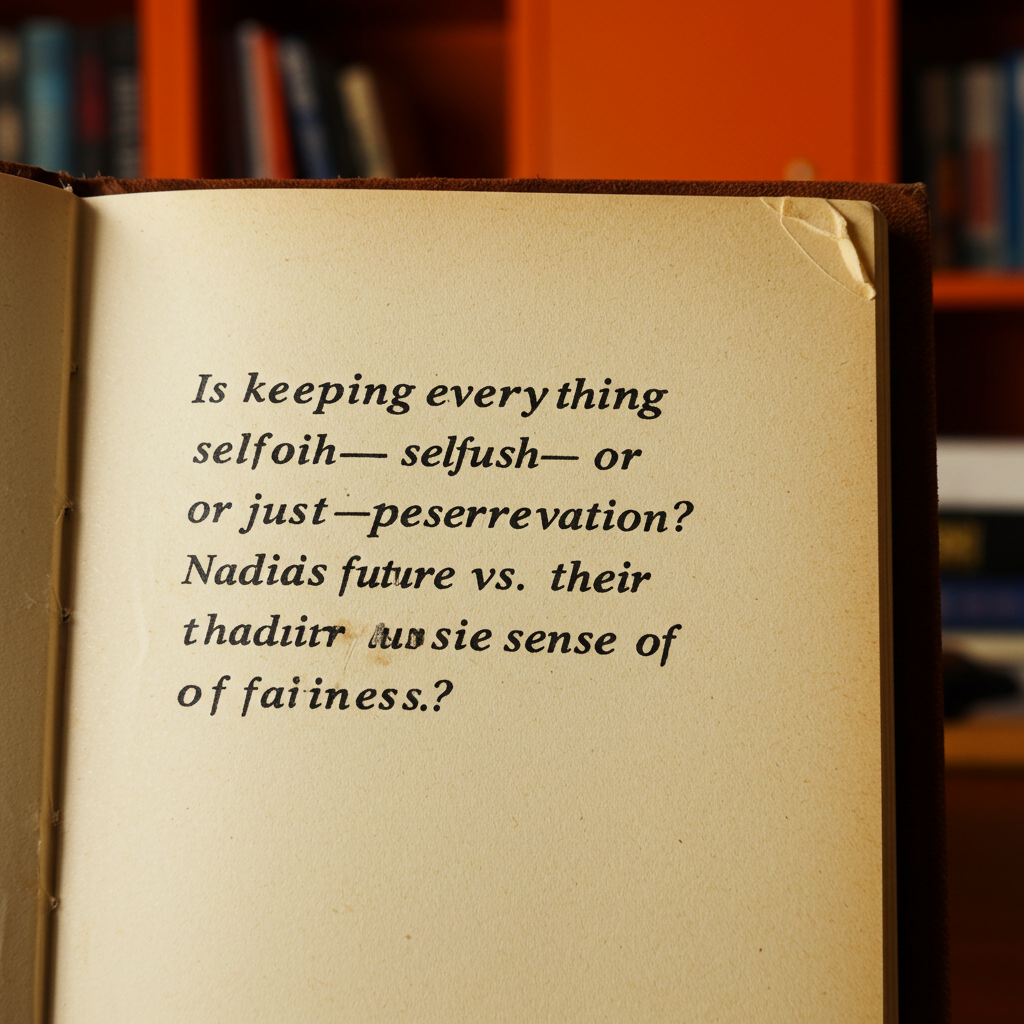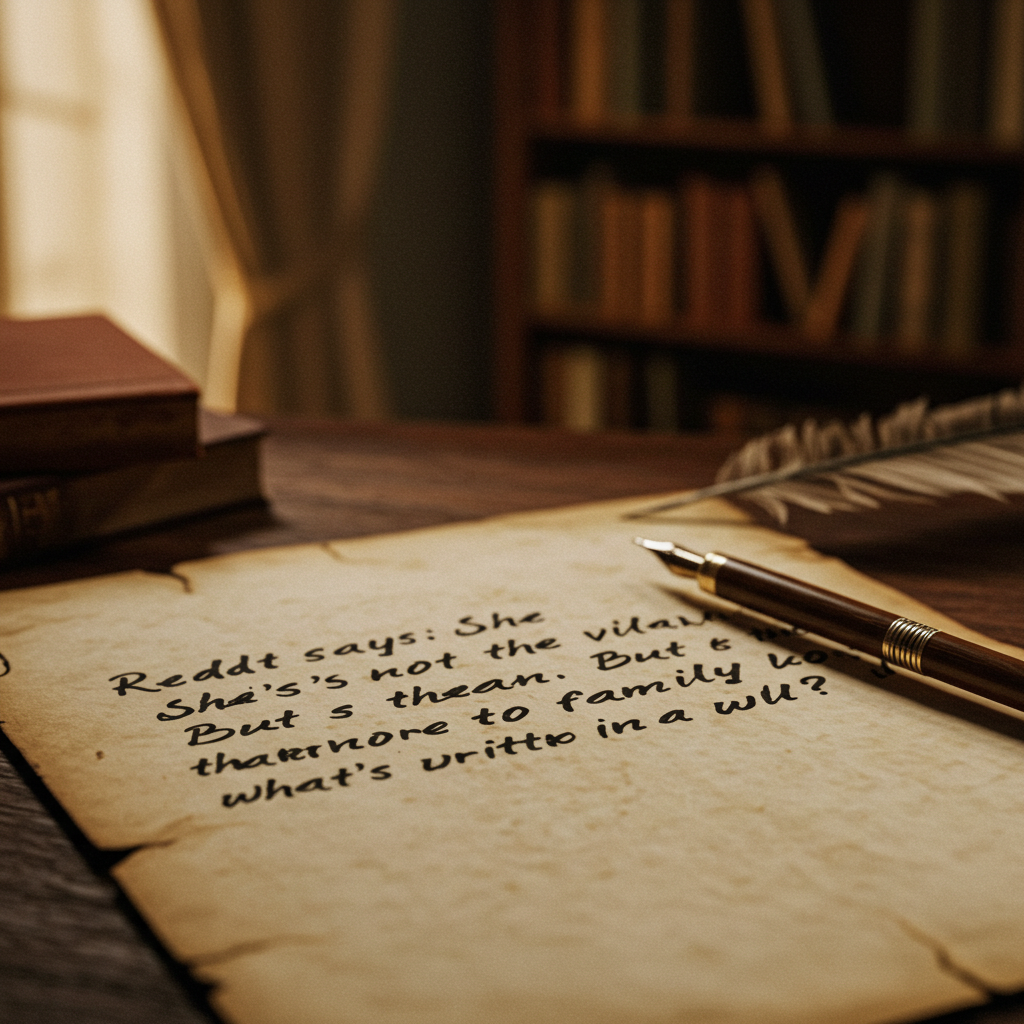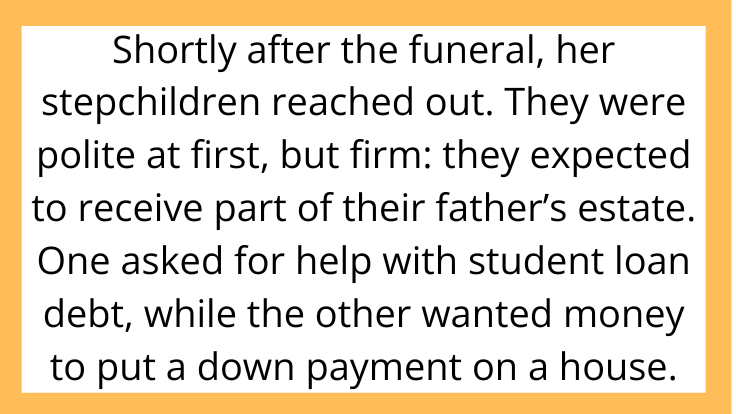AITAH for Refusing to Share My Late Husband’s Inheritance with His Adult Children?
When grief meets money, even the closest families can crack. Today’s AITAH story revolves around a widow’s tough decision to protect her financial future—and the backlash she received from her late husband’s adult children.
Is she safeguarding her survival or hoarding what was never fully hers? Let’s unpack the drama.
The Situation: A Widow Left Behind

A 54-year-old woman—let’s call her Nadia—posted on r/AITAH, seeking perspective. Nadia’s husband passed away unexpectedly last year. They had been married for 12 years, and during that time, they built a stable life together. Her husband had two adult children from a previous marriage, both in their late twenties.
When he died, Nadia was the sole beneficiary of his will. He left everything to her: the house they lived in, his savings, and a modest life insurance policy. According to Nadia, this wasn’t a surprise. They had discussed it many times. Her husband trusted her to make decisions about helping the kids if needed—but didn’t require her to divide the estate.
That’s where the trouble began.
The Conflict: “You Owe Us Our Father’s Legacy”

Shortly after the funeral, her stepchildren reached out. They were polite at first, but firm: they expected to receive part of their father’s estate. One asked for help with student loan debt, while the other wanted money to put a down payment on a house.
Nadia gently declined.
She explained that while she cared for them, the money was now her sole safety net. She had no plans to remarry and was nearing retirement. Her late husband’s assets were what she would now rely on to survive.
That’s when the tone shifted.
They accused her of being greedy, heartless, and disrespecting their father’s wishes. One even claimed their father “would be ashamed” if he saw her now.
Feeling hurt and overwhelmed, Nadia turned to Reddit: Am I the villain for keeping everything my husband left me instead of sharing it with his kids?
The Debate: Legal Rights vs. Moral Responsibility

Nadia’s Perspective: Security Comes First
Nadia isn’t wealthy. While the inheritance may seem like a windfall to her stepchildren, it’s not. It’s just enough to get her through retirement without serious financial stress. She has no children of her own and no backup income.
Legally, her husband’s will is airtight. Ethically, Nadia argues, her husband wanted her protected—not pressured into splitting the estate out of guilt.
She also shared that the relationship with her stepchildren was always polite but distant. She wasn’t their “second mom”—she was simply “dad’s wife.”
Her Stepchildren’s View: Emotional and Financial Betrayal
From their standpoint, Nadia was in their lives for over a decade. They saw their father build wealth that, in their minds, should be part of their legacy.
They claim Nadia is treating them like strangers rather than family. To them, she’s clinging to money that includes assets built long before she came into the picture.
They believe she’s using legality to mask what they see as a lack of compassion.
Reddit Reacts: The Internet Has Spoken

Thousands of Redditors chimed in—and the overwhelming verdict was: NTA (Not The A**hole).
“You’re not a villain for honoring your late husband’s will,” one top comment read. “You lost your partner. They lost a parent. Both are painful, but only one of you is financially vulnerable now.”
Another user added: “The fact that they immediately asked for money speaks volumes.”
However, some offered a more nuanced view.
One commenter wrote: “You’re within your rights, but relationships are built on more than legal obligations. Maybe there’s a middle ground that acknowledges their grief and need without endangering your future.”
Inheritance and Stepfamilies: A Common Flashpoint

This situation isn’t rare. Blended families often face complicated financial dynamics after a death. Even with wills, emotions can run high, especially if:
-
There’s perceived favoritism.
-
Communication about estate planning wasn’t transparent.
-
Relationships were distant or strained before the passing.
In Nadia’s case, a lack of emotional closeness may have made the divide feel even more stark.
What Could Have Helped?

For Nadia:
-
Setting clear expectations with the stepchildren while her husband was still alive.
-
Offering a symbolic gesture—a small inheritance or memento—might have softened the fallout.
-
Seeking professional mediation could have helped navigate emotions and expectations.
For the Stepchildren:
-
Understanding that grief doesn’t justify entitlement.
-
Respecting the boundaries of a grieving spouse.
-
Recognizing that their father’s final wishes, even if imperfect, deserve respect.
The Verdict: Not a Villain, But Maybe an Opportunity Missed

Legally and emotionally, Nadia was within her rights. Her responsibility now is to herself—especially if no promises were made.
But this isn’t just about law. It’s about legacy, family, and how we manage grief. Nadia may not owe them financially—but offering empathy, communication, or even a token of remembrance could preserve a fragile connection.



